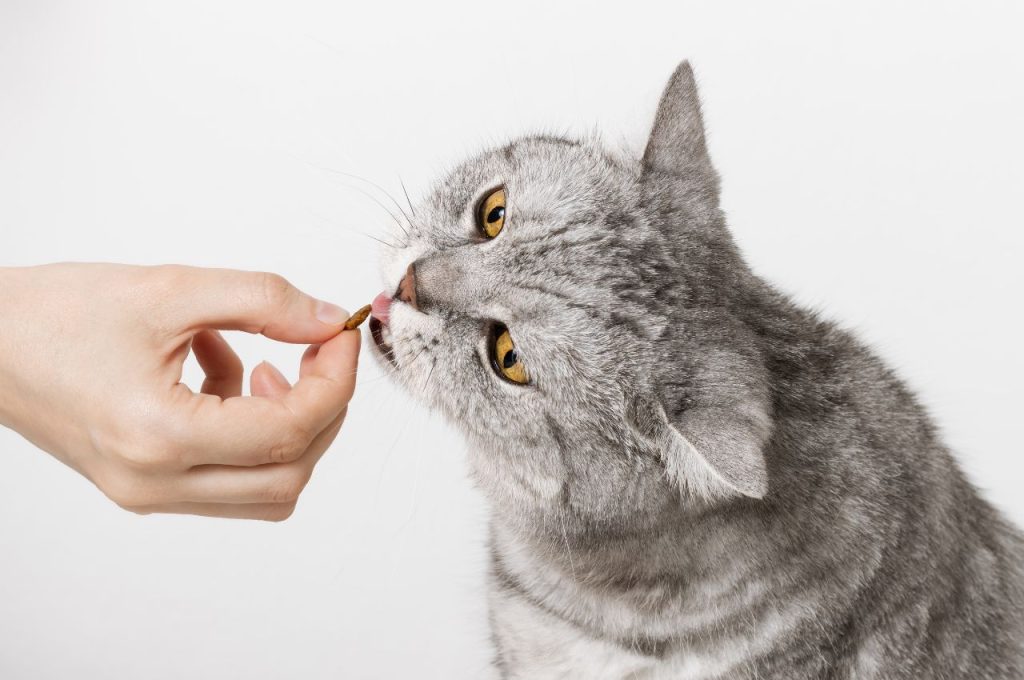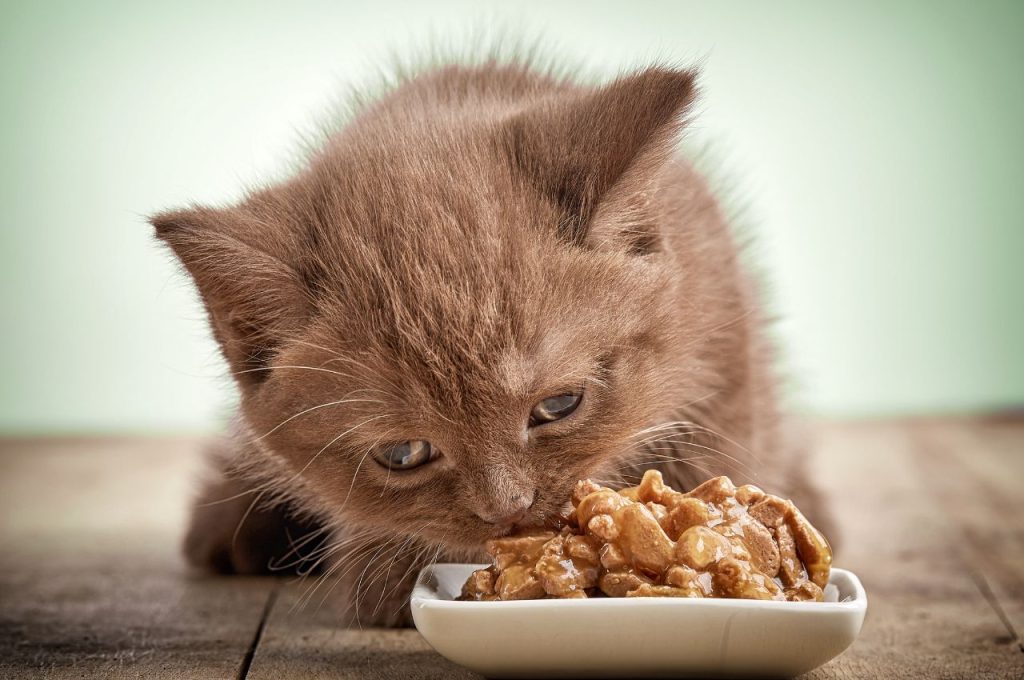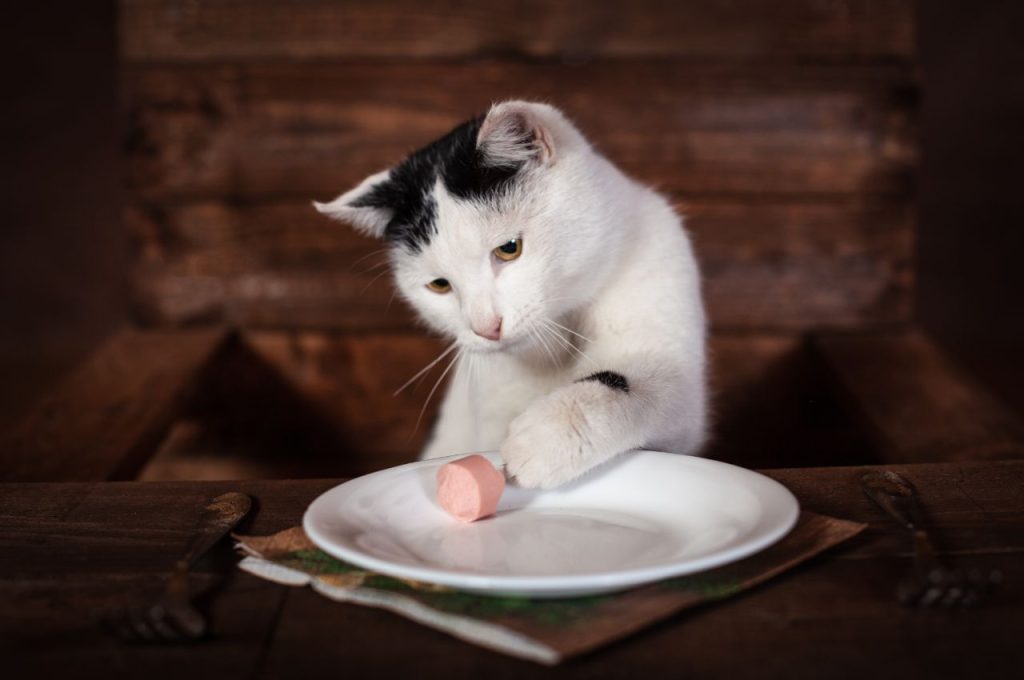Cats needing to gain weight can benefit from high-calorie, protein-rich human foods like cooked eggs and lean meats. Certain dairy products in small amounts, like cottage cheese, can also be helpful for weight gain.
Cats are often seen as independent creatures, with particular dietary needs that differ greatly from humans. While most of their nutrition should come from a portion of balanced cat food, underweight cats might require extra calories and nutrients to help them gain weight.
As obligate carnivores, cats need a diet high in protein to thrive, which makes human foods like cooked chicken, turkey, and fish potential supplements to their regular cat food. Care should be taken to ensure these are prepared simply, without added seasonings or onion and garlic, which are toxic to felines. Small portions of certain human foods can be beneficial, but it’s crucial to consult a veterinarian before introducing new items into your cat’s diet, to avoid digestive issues or food intolerances. With the right approach, human foods can be a valuable tool in helping underweight cats reach a healthy weight.
Understanding A Cat’s Weight
Understanding a Cat’s Weight is fundamental for pet owners aiming to maintain their furry companion’s health and happiness. A cat’s body weight is an excellent indicator of its overall well-being. Ensuring cats maintain an ideal weight can prevent a host of health issues and promote a longer, more energetic life. Whether you’re seeking to help your cat gain weight through a diet inclusive of certain human foods or focusing on weight management, it’s imperative to first determine what constitutes healthy weight parameters for cats.

Determining Ideal Cat Weight
Establishing an ideal weight for cats depends on several factors such as breed, age, body type, and activity level. An effective method includes consulting with a veterinarian who can assess your cat’s individual needs. Body Condition Scoring (BCS) is a standard tool used by vets to classify a cat’s body weight. A BCS chart typically ranges from 1 to 9, with 1 being severely underweight and 9 being severely overweight. The ideal score for most cats is generally around 4 or 5, indicating a well-proportioned body size.
Identifying Underweight Cats
Recognizing an underweight cat is key to taking proactive steps in providing a nutritional diet that can aid weight gain. Signs of underweight cats include:
- Visible ribs, spine, and pelvic bones without palpable fat.
- Lack of muscle mass.
- Noticeably less energy and enthusiasm.
- Diminished shiny coat or hair loss.
If these signs are evident, it’s advisable to seek guidance from a professional before making dietary changes.
Recognizing Overweight Cats
In contrast, an overweight cat will exhibit characteristics such as excessive body fat covering the ribs, limited mobility, and a rounded belly swinging beneath them when they walk. A cat with noticeable weight issues might require a weight management plan rather than a high-calorie diet. Nonetheless, professional advice is always recommended to tailor a suitable plan for your cat’s weight condition.
| BCS Score | Weight Status | Action Needed |
| 1-3 | Underweight | Consider calorie-dense foods |
| 4-5 | Ideal Weight | Maintain current diet and exercise |
| 6-9 | Overweight | Implement a weight loss strategy |
Healthy Ways to Help Cats Gain Weight
When it comes to our feline friends, maintaining proper weight is crucial for their overall health. An underweight cat may face various health challenges, from a weakened immune system to a lack of energy. Healthy weight gain for cats should be approached with care and thoughtful consideration. Here’s how to ensure your furry companion gains those extra ounces safely and effectively.
Consulting A Veterinarian
Before making any diet changes, it’s essential to seek professional advice. A veterinarian will provide valuable insights into your cat’s health and recommend a tailored plan for weight gain. They might suggest:
- Specific tests to rule out underlying health issues
- A dietary regimen catered to your cat’s individual needs
- Guidance on the amount of food and frequency of feeding
Choosing The Right Food
The cornerstone of helping your cat gain weight is investing in high-quality food. Look for options rich in proteins, fats, and calories. Calories provide the energy needed for weight gain, and the right balance of nutrients supports overall well-being. Aim for food specifically designed for weight gain or kitten formulas that tend to be higher in calories.

| Type of Food | Benefits |
| High-protein dry food | Supports muscle growth and energy levels |
| Calorie-dense wet food | Provides hydration and enhanced appetite appeal |
| Supplements | Adds essential vitamins and minerals |
Feeding Techniques for Weight Gain
Altering feeding techniques can significantly impact your cat’s weight. Frequent, small meals throughout the day can encourage increased calorie intake. This mimics a cat’s natural hunting behavior and may stimulate their appetite. Consider these methods:
- Implement a feeding schedule with multiple smaller meals
- Warm the food slightly to enhance aroma and palatability
- Use interactive feeding toys to pique interest
Ensuring your cat’s environment is stress-free can also have positive effects on their eating habits. A relaxed cat is more likely to have a healthy appetite, vital for weight gain.
Additional Factors to Consider
Understanding the dietary needs of a cat aiming to gain weight involves more than just increasing their calorie intake. It’s imperative to consider other lifestyle and health factors that can significantly contribute to their overall well-being and weight management. Let’s delve into three essential aspects to keep in mind.
Exercise and Physical Activity
Engaging your cat in regular exercise is critical, even when the goal is weight gain. It may seem counterintuitive to encourage physical activity for a cat that needs to put on pounds, but adequate exercise ensures proper muscle build-up and stimulates appetite. A balance of playtime and rest supports healthy metabolism and contributes to weight gain in a sustainable manner.
- Laser pointers and feather wands are excellent tools for interactive play sessions.
- Consider climbing structures or perches to encourage jumping and climbing.
- Puzzle feeders can merge mealtime with activity, promoting both mental stimulation and physical exertion.
Managing Stress and Anxiety
Stress and anxiety can play a substantial role in your cat’s ability to gain weight. A stressed cat might eat less or display digestive issues that impede proper nutrition absorption. Ensuring a calm and stable environment is essential for their health. Be mindful of changes in the home that could affect your pet’s emotional state, and take steps to reduce potential stressors.
Consider the following to promote a stress-free environment:
- Create quiet spaces where your cat can retreat and feel safe.
- Maintain a routine to provide a sense of predictability and security.
- Look into pheromone diffusers or calming supplements recommended by your vet.
Monitoring Any Health Issues
Underlying health conditions can hinder weight gain and even lead to weight loss in cats. Thus, it’s crucial to monitor your cat’s health closely and seek veterinary advice if weight loss persists or other symptoms appear. Conditions such as gastrointestinal problems or dental issues can affect your cat’s appetite and ability to eat properly.

Regular veterinary check-ups ensure timely detection and treatment of any health concerns, facilitating a tailored diet plan for your cat’s specific needs. Take note of any unusual signs:
| Symptoms | Possible Health Concern |
| Vomiting or Diarrhea | Gastrointestinal Issues |
| Poor Appetite | Dental Problems or Systemic Illness |
| Changes in Thirst or Urination | Kidney Disease or Diabetes |
Conclusion
While it’s essential to consult with your veterinarian before making any significant changes to your cat’s diet, incorporating select human foods into their meals can be a safe and effective way to help underweight cats gain weight. From protein-rich options like cooked chicken and turkey to nutrient-dense choices like canned pumpkin and plain yogurt, various nutritious foods can provide valuable calories and nutrients for cats in need of extra nourishment.
However, it’s crucial to introduce new foods gradually, monitor your cat’s weight gain progress, and ensure that any additions to their diet are appropriate and well-tolerated. With proper care and attention, you can help your cat achieve a healthy weight and enjoy a vibrant and active life.
